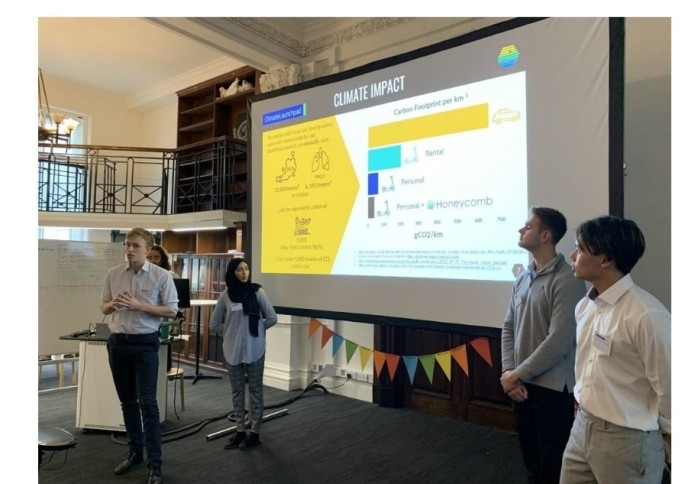Climate innovation startups join the second cohort of The Greenhouse accelerator

Honeycomb Network pitching their business idea.
14 startups, including teams supported by Imperial College London, have been selected to join the second cohort of The Greenhouse accelerator.
Low-cost, sustainable omega-3 for aquaculture, a new carbon negative concrete, AI software that improves production yields in metals manufacturing, and a home-compostable film made of seaweed are among the innovative solutions developed by the startups joining the programme.
The Greenhouse aims to support the growth of young, sustainable businesses looking to tackle climate change. It is a 12-month innovation programme for climate positive technology startups that offers early-stage (pre-seed) entrepreneurs access to business coaching with experienced professionals, a range of masterclasses, free workspace at the Royal Institution and equity-free grant funding.
Naveed Chaudhry, Co-Founder and Head of The Greenhouse at Imperial’s centre for climate change innovation, said: “We are thrilled to have 14 startups joining our growing community of climate innovators in London. Their innovative and ground-breaking solutions are an important contribution to accelerating the transition to net zero.”
Professor Richard Templer, Director of Development for Chemistry and Director of Innovation at the Grantham Institute, said: “The teams joining The Greenhouse have shown they are very passionate about climate change and committed to achieving their vision. I look forward to these businesses becoming commercially successful enterprises and having significant climate impact.”
The Greenhouse accelerator is part of a new centre for climate change innovation, a major joint initiative between the Grantham Insititute at Imperial and the Royal Institution. It is backed by six founding members: Arup, the Mayor of London, HSBC UK, Centre for Net Zero, Pollination and Slaughter and May. The centre brings businesses, entrepreneurs, policymakers, academics and the public together around climate change innovation, creating a focus for London-based innovators to implement global change through pioneering, practical solutions.
The second cohort of The Greenhouse includes:
- Angry Monk: an online platform aggregating fresh, quality surplus across the supply chain which is then sold to restaurants, institutional canteens and food manufacturers
- AromatEco: modifies microorganisms to produce carbon negative flavour and fragrance chemicals from carbon dioxide
- Bulkify: an online platform offering a new way to buy sustainable zero-waste groceries
- Collectiv Intelligence: a software that aims to be the world's most robust database for emerging climate technologies
- Deep.Meta: AI software that improves production yields and lowers carbon dioxide emissions in metals manufacturing by identifying potential defects before they happen
- Deploy Tech: an innovative and sustainable water storage solution for drinking water, agriculture and wildfire mitigation
- ESG Base: an AI tech platform that helps investors and policymakers deploy their funds and efforts to greener, more sustainable and resilient real assets and infrastructure
- Evotrack: a data analytics service that helps businesses and urban planners to accurately manage the deployment and life cycle of public electric vehicle charging infrastructure
- FlexSea: a revolutionary home-compostable film made of seaweed, a sustainable and affordable resource
- Honeycomb Network: aims to develop, install and then operate a network of smart charging e-scooter lockers across the UK
- OptimalSlope: a user-friendly geotechnical software to optimise the design profiles of open pit mines, and thereby reduce their environmental impact
- Seratech: a revolutionary new carbon negative concrete to help decarbonise the built environment
- Synthesea: a synthetic biology platform that engineers bacteria to produce sustainable and affordable omega-3 for aquaculture
- ZeroBees: democratising carbon consulting and demystify carbon footprinting so that all organisations can work to minimise their climate impact and achieve net zero
Applications for the third cohort of The Greenhouse will open in late October.

The Greenhouse is part of the Centre for Climate Change Innovation (CCCI). It is co-funded by the 2014 to 2020 European Regional Development Fund programme.
Article text (excluding photos or graphics) © Imperial College London.
Photos and graphics subject to third party copyright used with permission or © Imperial College London.
Reporter
Rosa Salazar Benazar
The Grantham Institute for Climate Change